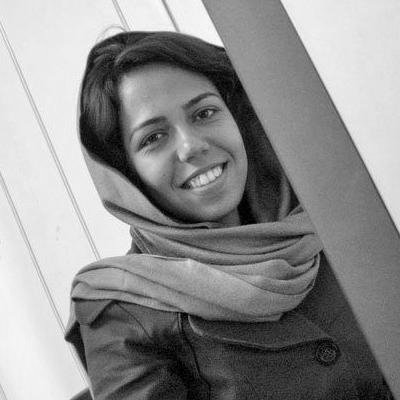
Last Update
Feb. 17, 2021
Organisation
Tejarat-e Farda Weekly
Gender
Female
Ethnic Group
Unknown
Religoius Group
Shia
Province
Tehran
Occupation
Journalist
Sentence
Unknown
Status
Released
Institution investigating
IRGC Intelligence
Charges
Collaboration with foreign media
Propaganda against the regime
Date of Birth
1982
Saba Azarpeik Released
Iran’s hardliners were further angered when Azarpeik published frank and thorough interviews with Mohammad Sadegh Kooshky, reputed to be a media analyst for the Intelligence Ministry, and Ali Akbar Javanfekr, media consultant to former president Mahmoud Ahmadinejad and former head of official news agency IRNA.
Azarpeik was first arrested on January 28th 2013, alongside a group of other reporters, including journalists working for reformist-leaning publications Shargh, Arman, Bahar, Aseman and Etemad, that Azarpeik worked at. Security agents raided Azarpeik’s home at 8:00 pm. They did not present her with an arrest warrant, so she resisted and closed the door. Agents then broke down her door, searched the house, physically assaulted her and arrested her. They presented her with a warrant only after she was in detention.
She was released on bail in early March 2013. Azarpeik and the other arrested journalists were charged with communicating with foreign media, including the BBC. A week prior to the arrests, Iran’s Attorney-General Gholam-Hossein Mohseni-Ejei declared that authorities were in possession of“information from reliable sources” that journalists were working for both Iranian and foreign media—implying that they passed on crucial information to international outlets. The government should not be criticized for arresting individuals guilty of such obvious crimes.
Azarpeik was arrested for a second time on May 28th, 2014, outside her home. Agents did not present a warrant. They took her to the offices at the weekly publication Tejarat-e Farda and confiscated two computers, one of which belonged to a colleague. She was then taken to a detention center. During her detention, Azarpeik was only allowed to make two short phone calls to her family. Her mother, Akram Mohammadi, was allowed to see her briefly on July 21st.
“I saw her for a few minutes with the permission of Judge Moghisei,” the Mohammadi told IranWire. “She had a high fever. That heat is still burning through me.” No government agency took responsibility for the arrest and authorities never informed Azarpeik’s family or the public of the charges against her.
Azarpeik’s lawyer, Mahmoud Alizadeh Tabatabaei, stated that though he has not been officially informed of any charges, Evin Prison’s prosecutor’s office told him that she was charged with “propaganda against the regime”. A week after Azarpeik was arrested, Tehran MP Ali Motahari said that the Islamic Republic Judiciary was responsible for her arrest. But according to the journalist’s mother, the detention center used by the judiciary was under construction, so she was kept in solitary confinement at the Revolutionary Guards’ detention center.
When asked by reporters about her condition, President Hassan Rouhani promised to look into the matter but his promise was never fulfilled. Eyewitnesses who saw Azarpeik at Branch 26 of the Revolutionary Court on July 26th said she had lost significant amounts of weight and appeared very pale, a condition they attributed to the long period she was kept in solitary confinement. According to Azarpeik’s lawyer, two cases were brought against her, one which went to court. There was no indictment issued for the second case and therefore it remained with prosecutors. Her lawyer, Mahmoud Alizadeh Tabatabaei, told IranWire that he did not attend the court hearing for the first case, as he was not listed as the lawyer handling it. As a result, he said, “she was not represented by a lawyer.”
Azarpeik’s mother created a Facebook page to post news about her daughter, but two days after the page went live, she received threats stating that the conditions in which Azarpeik was being held would become harsher and her condition would deteriorate if she continued her reports. After that, she refrained from publishing Facebook posts about her daughter. “I never expected they would take a daughter hostage and then threaten her mother, informing her that her child’s life is in danger,” she said.
Saba Azarpeik was released on August 21st, 2014.
On February 7, 2021, Ms. Azarpeik's husband, Ataullah Hafezi, reported that his wife had been “illegally detained” and “without a summons” by the cyber police of the Islamic Republic.
He said Azarpeik had been transferred to the Cyber Crimes Court after her arrest.
Hafizi wrote on his Twitter page: “At 6pm, the bail request from me and Ms. Razzaghi, lawyer of the case was rejected. At 10pm as she had taken refuge in the prosecutor’s office and was crying to have the proceedings be transcripted, she was carried out violently and illegally by four agents."
Hafizi linked his wife's arrest to a “suspicious event in the judiciary.”
In the weeks leading up to Ms. Azarpeik's arrest, she had asked questions from Ebrahim Raeisi, the head of the judiciary, on social media, which the media reported as the reason for her arrest.
After two days of detention, Ms. Azarpeik was released on bail on February 8, 2021.
“Still looking for corruption and is the loud voice of the poor and strong Iranian society” her husband wrote on his Twitter account, announcing the journalist's release.
No information has yet been released on the charges against the journalist.